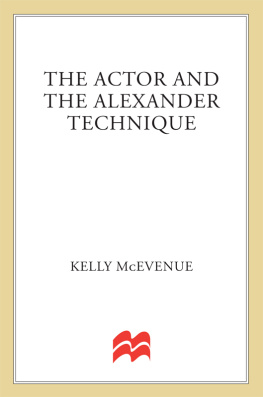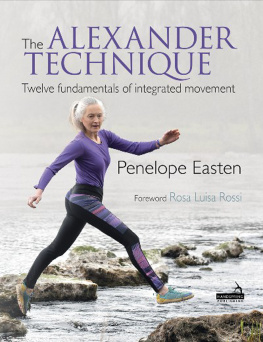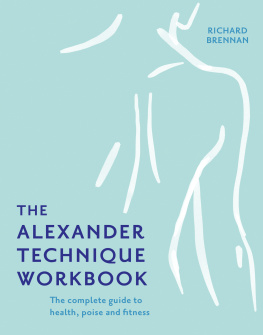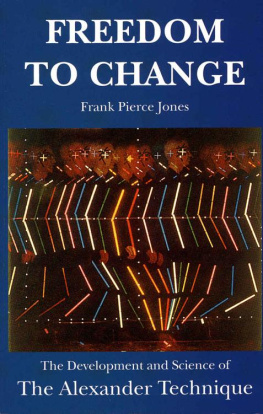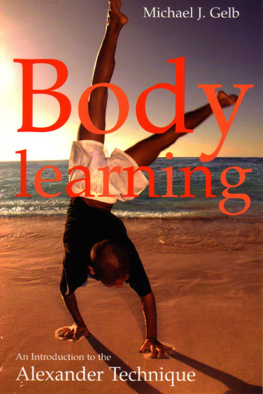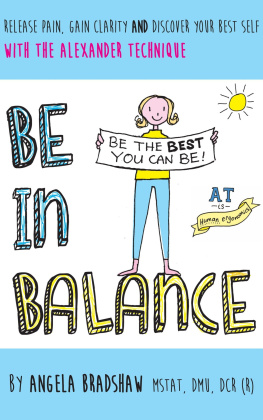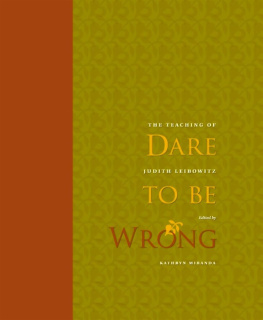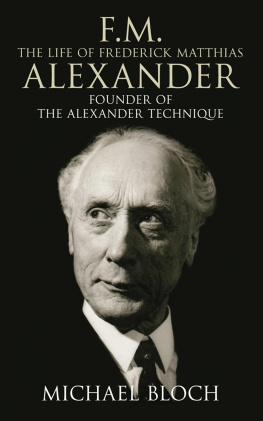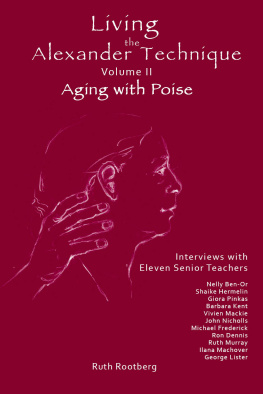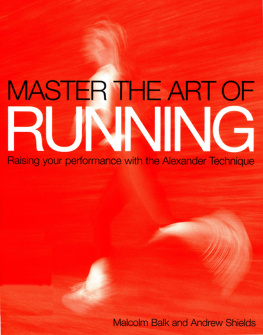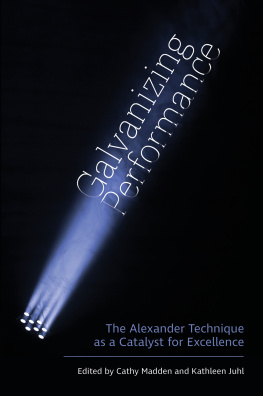Contents
Guide

The author and publisher have provided this e-book to you for your personal use only. You may not make this e-book publicly available in any way. Copyright infringement is against the law. If you believe the copy of this e-book you are reading infringes on the authors copyright, please notify the publisher at: us.macmillanusa.com/piracy.
Contents
by Patsy Rodenburg
Kelly McEvenue trained with Frank Ottiwell at the American Center for the Alexander Technique, San Francisco. She has taught extensively in Canada, with the Stratford Festival Theatre Company and the Stratford Festival Conservatory for Classical Theatre Training. In Toronto, she has taught at the Soulpepper Theatre Company, Mirvish Productions (on The Lion King ), the University of Toronto Opera School and the Ryerson Theatre School. Internationally, she has taught at the Guildhall School of Music and Drama, London; the Centre for Development and Graduate Training in the Alexander Technique, London; and the Interlochen School for Performing Arts, Michigan. Kelly has assisted Patsy Rodenburg in her workshops for voice teachers at Britains Royal National Theatre. She has been a movement consultant for television and film. Kelly lives in Toronto, Ontario, with her photographer husband Michael Rafelson and daughter Molly.
To my parents,
one loved the literature on it and one loved to move.
I would never have written this book without a gauntlet being laid. My deep-felt thanks to Patsy Rodenburg, whose friendship has always presented me with challenges and opportunities. Thanks to Michael Earley who helped me with the conception of this book, to my editor David Salmo and to the staff at Methuen who helped me through to completion.
I wish to acknowledge the countless actors and students who have participated in my work, they are the heart and soul of this book. To the actors and theatre folk whose voices and experience were shared: Brian Bedford, Butch Blake, Martha Burns, Joyce Campion, Andrew Croft, June Crowley, Cynthia Dale, Diane DAquila, Marion Day, Megan Dunlop, Stephen Dow, Colm Feore, Jude Haines, Desmond Heeley, Rita Howell, William Hutt, Krista Jackson, Debra Johnson, Eleanor Johnston, Claire Jullien, Dirk Lombard, Roberta Maxwell, Seana McKenna, Stephen Ouimette, Lucy Peacock, Janine Pearson, Goldie Semple, Ian Watson, Judy White, Jamie Williams I could not have written this book without your insight.
To my family, teachers and friends, who know exactly how they have supported me throughout my teaching years, and with this project: Marj Barstow, Nancy Brown, Roy Brown, Laura Burton, Serena Condello, David Gorman, Mimi McEvenue and Geoff Love, George and Debbie McEvenue, Sheilagh McEvenue, Kiloran McRae, Sandra Niman, Frank Ottiwell, Mary and Burke Seitz, John Wood, Meg and Greg Young.
I am most grateful for my two inspiring artists, who know me best and see me through everyday, thanks to my daughter Molly and my husband Michael Rafelson.
Kelly McEvenue is one of the worlds finest Alexander teachers and theatre coaches.
Kelly and I first met at the Stratford Festival Theatre, Ontario, Canada, in 1984. This began a creative working partnership that has grown over the years and constantly enhances my teaching. Kelly has spirit, enthusiasm and joy when she works. She always uses positive reinforcement to release actors, never negativity.
Back in 1984 Kelly and I were part of a large movement and voice team at the Festival Theatre. Every morning there was a compulsory company warm-up from 10.00 to 10.45 up to 70 actors gathering to be worked-out by a movement coach, followed by a vocal workout taken by me. Kelly had not been contracted to take the movement warm-up but started to attend to watch the work.
Anyone who has ever coached in a large theatre company will be keenly aware that those companies always contain a contingent of actors who, for whatever reason, are not ambitious, not hungry to be good, changed or worked. They are content to swell a scene or two, speak a few lines. Acting is a mundane job to this breed. They are mostly men, mostly the heavy-drinking, heavy-smoking brigade. They are often cynical and dont really want to rehearse and they definitely dont want to attend a morning warm-up! In short, they are the coachs nightmare. It is easy to teach ambitious actors and students but this contingent is the real test.
Kelly and I were sitting watching in horror as the movement coach was losing control of the company warm-up. Actors were standing around chatting at the back of the rehearsal room, not working, not listening and the coach was close to tears. Suddenly, Kelly was on her feet. Her energy and engagement immediately focused the company. Come on guys, she said lets warm up. Lets learn how to lean on a bar using the Alexander Technique. They laughed and she had them working within minutes.
For me that was the first sign of Kellys skills, but she also warmed them up in such a way that made my following voice session more efficient. We had begun to work in harmony.
All teachers want to work on their subject profoundly and organically but in large theatre companies coaches rarely get to work in this way. Many coaches end up despairing about restrictions placed on their work. Not Kelly. Her humour and flexibility is essential in a company. She does her work when and how she can without devaluating the Alexander Technique but aware that she cant be precious about it when a companys demands on an actor are so complex.
These demands from directors, tight schedules and the nature of high-tech productions can place an actors body at risk. I know that Kellys calm and realistic approach to her work has saved many actors bodies and, consequently, their careers.
So it can go like this:
The rehearsed fight between 20 heavily armoured knights wielding enormous swords is relocated at the technical rehearsal on to a steep rake beside a 10-foot drop. The actors can hardly see through their visors, they are sliding on the rake, pulling their knees, back, shoulders and necks. They are furious and feel pressurised because the director is trying to finish the technical before the first public preview in the evening.
Enter Kelly. Without stopping the flow of the rehearsal she will make the fight safe. Make each individual centred and calm. Actors will laugh with Kelly, stop moaning. She will solve the problems yet maintain the artistic shape of the fight.
Kelly likes actors; she wants them to succeed and she constantly supports them. She never moans about actors or blames them when they dont come up to her standards. She just stays with them and supports them whenever they are in the process. Thats why I love talking about the work with her. So many coaches ridicule actors which is always depressing, as we are there to enable the artist not to mock them.
This book is a great insight into Kellys clear and essential work. For me this book will be a constant reminder of Kellys qualities when the Atlantic Ocean divides us. Anyone interested in theatre, the actors body and the process of training will find a wealth of insights and humanity in this book.
Patsy Rodenburg
August 2001
I truly love my job in the theatre. I am a certified teacher of the Alexander Technique. For over eighteen years, I have been teaching the Alexander Technique to actors at a large classical repertory theatre, the Stratford Festival Theater, in Stratford, Canada. I am employed by the theatre as a integral part of a support staff or coaching team, made available as a resource for the actors. The actors come to the classes because they are looking for tools and techniques to solve specific theatrical movement or vocal problems.

